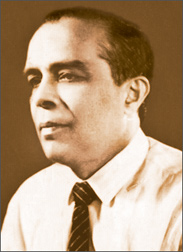True teacher is a learner all his life
The second memorial lecture in honour
of Prof. Nandasena Ratnapala was delivered at the BMICH on August 10.
The speaker was Jaffna University Vice Chancellor, Professor Nagalingam
Shanmugalingam. The following article is based on that.
It was an emotional moment when Hasala and Aseni Ariyaratna, the two
grandchildren and Prof. Nagalingam Shanmugalingam, garlanded Professor’s
Portrait at the outset.The theme of the oration was “Living in Research
with Prof Nandesena Ratnapala”. Prof. Shanmugalingam paying tribute to
Prof. N. Ratnapala mentioned that he was a great scholar. He was
especially a people’s man; meeting, observering discussing and living
with people was the highest feature in his life.
Prof. Ratnapala was linked to the University and undergraduate study
and sought to engage University with the community. Prof. Shanmugalingam
referring to the role of higher education in development said university
was an “open stage” where students could find ways and means to
experiment their ideas. Therefore universities should embody norms of
social tactics such as open debate and argumentative reasoning. It could
serve the purpose of making use of its autonomy, dignity and
self-reliance of its individual members.
|

Prof. Nandasena Ratnapala |
It should also reject its discrimination based on gender, ethnicity,
religious belief or social class.
“The best higher education is a model and source of measure for
creativity and modern civil society. This is an ideal not often
realized”.
Universities therefore should promote skills and attitudes to
citizens through various university experience.
At present universities are involved in awarding degrees, conducting
research for degrees for monetary gains, as work, as politics of
knowledge and for human and social development.
Coming to the key ingredient of research and research in sociology in
particular, one has to first understand the importance of sociology as a
science which promotes new knowledge for human and social development.
The position of sociology is the natural world and social world are
governed by same principles. Prof. Ratnapala’s exercise in research was
an alternative radical methodology against stale practices and it did
not consider universities purely as degree awarding institutions.
The nature of positivism versus
phenomenology
Since matter has no consciousness its behaviour can be explained
simply as a reaction to external stimuli. He or she sees, interprets and
experiences the world in terms of meanings, actively constructs his/her
own social reality.
Prof. Ratnapala’s methodology was ahead of numerical and often
conducted in natural surroundings. His study of research promotes human
experience that give us qualitative research that are words or texts
rather than numbers to describe the experiences that are being studied.
Such research carries thick descriptions rather than crisp and terse
background of information, comfort with contradictions and may include
representatives of ethnographic prose, historical narratives, first
person accounts, still photographs, life histories, biographical and
quto-biographical material rather than mathematical models, statistical
table, graphs and third person narratives.
Prof. Ratnapala’s Living in Reseach was prompted by phenomenological
research approach in sociology. Prof. Ratnapala will be best remembered
for his courage and pioneering efforts in seeking new paths of research,
especially in social studies. He is better known for his research on the
life of beggars, when the don himself became a beggar and carried out
the study.
He is also one of the pioneers in popularizing sociology among the
masses through his readable and interesting articles especially to the
Sinhala press, which were accepted countrywide.
“Prof. Ratnapala’s concentration and deep study areas shunned the Sri
Lankan academics of the ‘wretcheds’ of our society, from street children
to beggars, vagrants and waifs. His wide range of interests included
rural poverty, the impact of tourism on society, the folklore of Sri
Lanka and sociological aspects of religious behaviour, drugs and
narcotic and Buddhism”, were widely acclaimed quotes of President
Mahinda Rajapaksa in referring to his contributions.
The major works of Prof. Ratnapala include texts on anthropology,
sociology and criminology. Many texts, novels, poetry, paper articles
were based on his numerous articles presented in Sinhala and English at
national and international forums.
His language skills and closeness to people are well portrayed
through these.
Professor Ratnapala was not a different man doing a different job
when it came to conduct of research.
He had a vision of his own. The researcher must understand the people
and the client. There is no better way than by living and immersing with
them. His ideology was not confined to a text or an arm chair.
“I am really unhappy that most of us engaged in village/rural
research target these essential qualities of a research worker. Today, I
think twice before I assign a post graduate student to field work, the
question that I could ask him/her is what could your research give to
the people? It would give you an MA or Ph.D but how about the people,”
Prof. Nandasena Ratnapala queried.
He also thought that there were many instances where the researcher’s
questionair or interview schedule was drafted elsewhere and sent to be
used here.
My contention is that in rural areas, especially the best method is
to live and work with the people as Prof. Ratnapala encouraged.
Prof. Ratnapala’s methodology was ahead of the numericals often
conducted in natural settings. Qualitative research is value laden,
subjective and sees closeness with actor by interviewing and observing,
inductive rather than deductive. It has multiple realities not just one.
Principle and samples purposefully chosen for diversity rather than in
random. In this context, we had much to gain from Prof N. Ratnapala’s
methodology and conduct of research.
“There is no substitute to this, than mastering the alphabet of the
village society or learning the grammar of the local society and
culture”.
He would venture to find out how close the researcher is to the
people, the extent of the sympathy and understanding towards them, the
conduct, manner and enthusiasm about the objective and the worldwide
curiosity to know them. |



